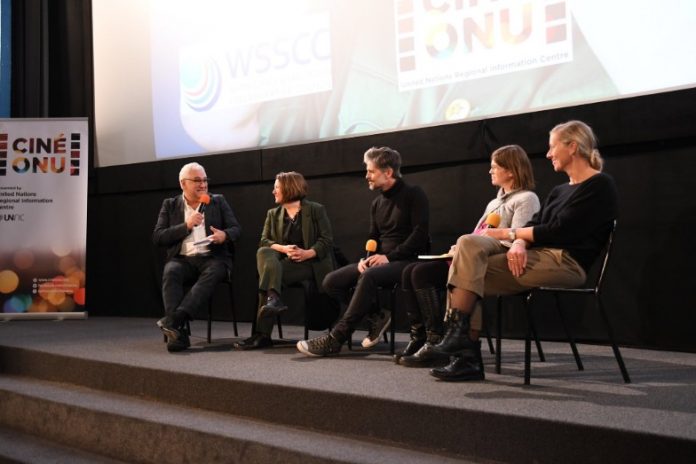On the 20th November 2019, Ciné-ONU screened ‘Mr Toilet: The World’s #2 Man’ in partnership with United Nations Office for Project Services (UNOPS) and Water Supply and Sanitation Collaborative Council (WSSCC) at Cinéma Galeries in Brussels to mark World Toilet Day.
Mr Toilet is a documentary about toilet enthusiast Jack Sim. He uses humour as his weapon to fight an uphill battle against bathroom taboos. He founded the World Toilet Organization and spent the last 13 years lobbying 193 countries to raise awareness for proper sanitation. He also successfully lobbied the United Nations to create World Toilet Day – the first international day of celebration for the toilet. This documentary follows his biggest challenge yet when asked to secure 6 million toilets for the “Clean India” initiative.
The panel consisted of Carolien Van der Voorden, Head of Technical Support WSSCC; Carlos Garriga, Project Manager of the We Are Water Foundation; Ellie Chowns, Green Party Member of the European Parliament; and Sophie Aujean, EU Representative for WaterAid; moderated by Carlos Jimenez, UNRIC. The discussion after the screening focused on the importance of sanitation in our lives and how to address the problem of the lack of access to basic sanitation, particularly in less developed countries.
Carlos Garriga remarked that, “although this guy is a little crazy, he doesn’t give up – the film shows how difficult it is to encourage social change particularly in cultures where there is open defecation”. The panelists agreed with the need for social change, but explained that this cannot be achieved by inflicting western solutions. Carolien Van der Voorden highlighted that, “currently there is an aspirational norm for a toilet which is very inappropriate”. Ellie Chowns agreed with this sentiment, stating that western style toilets are not suitable for everyone.
Ellie Chowns emphasized the role of the government in investing in housing and infrastructure, spending money on toilets as a priority and placing importance on recurrent costs. She also expressed some concern over the long-term sustainability of the work that development aid invests in.
Sophie Aujean told the audience how closely sanitation and gender equality are related, explaining that many girls skip school when they menstruate. Sophie Aujean suggested that the key is to make the issue political, because clean water and sanitation issues stem from inequalities. “Where I have hope is that there is a renewed political momentum to frame this as a human right, the EU and member states are still the biggest donors to hygiene”
A member of the audience stated she was a proud owner of a dry toilet and asked the panel whether they thought that dry toilets could provide a solution to sanitation issues. Carolien Van der Voorden remarked “It will take decades for the west to realise that toilets with water are not the most practical option”. She explained that the problem in the world at the moment is less about technology, and more about political prioritisation and resources, “there is not enough awareness of how important sanitation is for life”.
To see pictures from the evening, click here.
Follow us on Facebook and Twitter: @CineONU #CineONU






